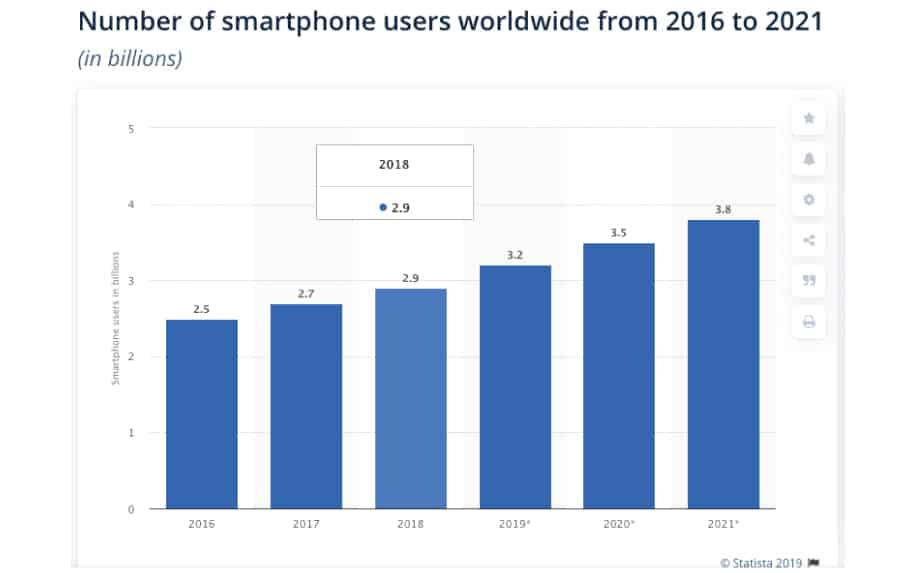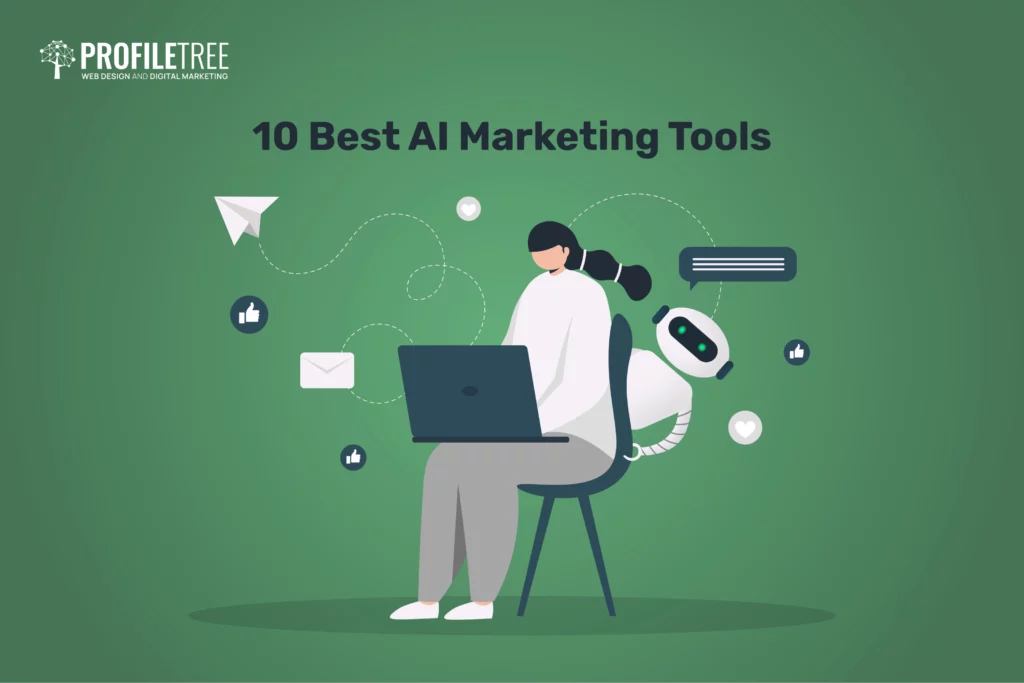Wherever there is an audience, there is a marketing possibility. These days, people spend more time than ever on their phones. To help take advantage of this, there are countless options for app development software.
There are several reasons to use these rather than going down the road of fully custom-app development. Business owners are always primarily concerned with their bottom lines.
App development software makes launching a mobile app cheaper and faster.
Today, TV advertisements are considered old-fashioned as the focus has moved towards internet marketing. Today, more than 5 billion people are estimated to own a smartphone. This figure is only growing globally:

Mobile has become the main way people consume content, communicate, and purchase.

This has created a surge of businesses channelling their focus to app development to capture their audience’s attention. Success stories about individual apps with millions of downloads partly inspire this.
App development might sound intimidating for a business looking to launch and grow online, especially if you are worried about the costs involved. Therefore, there has been a boom in the number of app development software platforms to make this process easier.
However, before we dive into the nitty gritty of your options for app development software, let’s talk a little bit more generally about what goes into creating a mobile app.
Table of Contents
What is App Development?
You may already have an idea for a theme for your business app that you want to develop. This is a good start. For absolute beginners, there are some basics that you should know before looking into mobile app development for your business.
First, you need to decide what platform you want your app downloaded from or if you want it to be available across several platforms. Each operating system has its platform.
For Android, there is Google Play. For Apple, there is the App Store. In addition, there are platforms for Windows and other smaller mobile operating systems. Each platform has its terms, benefits, and features.
Often, the more platforms you want to offer your app, the more you will have to spend on development, although this can be negated with different app builders and tools.
The common process of app development after the research stage can be broken down into the following stages;
- Wireframe,
- Technical Assessment,
- Prototype,
- Design,
- Development & Testing,
- Launch.
At least, these are the stages of customer app development. This process is often shortened by app development software. For example, if you use a tool heavily based on templates, there isn’t much need for the earlier stages of the development process, as these are done in advance. However, working with dedicated software team services becomes essential for more complex and customised applications to ensure a seamless and tailored development journey.
Should Your Business Get a Mobile App?
For some small businesses, looking into app development may exceed their budget. For others, it may be a priority as their business model may revolve around an app, either mobile app development or web app development.
Popular examples of businesses that revolve around mobile app development include Uber or any applications for ordering food from local restaurants.

The core of their business is making ordering a cab or a meal possible through a mobile application. They have done this by creating a medium through their app. But not every company can be Uber. So, what are the benefits for your typical local business?
Here are some reasons why your business should invest in app development.
Brand Awareness and Customer Loyalties
One of the golden rules of modern business is helping users interact with your customers through their preferred channels. To reach your audience, you need to be where they are.
This is also important for increasing customer loyalty and maximising brand interactions.
Having an app means your customers will see your company on different platforms. It will make your business look more familiar, serious, and trustworthy. This is your first step towards making the conversion of a sale.
Ease of Access
Most search queries are done on mobile devices, and it can be extremely off-putting for a user, as business websites are often not mobile optimised. This can cause the business to lose potential sales and customers completely.
Apps are more efficient regarding speed and features; they are designed for mobile devices like smartphones and tablets, so they are way easier to handle.
Better Customer Service
Your new and existing audience feel more comfortable and secure knowing that they can reach your business anytime, anywhere.
If they know they can contact you for an inquiry, a purchase, book an appointment or a complaint through an app, it will make them favour your business over another that didn’t consider adding app development.
When you offer an app service to your clients, you somehow provide them with a personal assistant.
A Digital Marketing Channel
As you get closer to your customers, you can upsell them new products and services your business may be offering. You can offer your customers promotions and discounts by sending reminders and notifications.
This is an excellent way to keep in touch with your clients.
Types of Apps
Apps can be created using several different tools or protocols. Most business owners don’t need such in-depth knowledge of these that they could build their app from scratch.
Rather, having enough knowledge to have an informed conversation with a specialist is important.
There are several types of apps:
- Native,
- HTML5,
- Hybrid.
Native apps are created for a specific platform (iOS or Android) using the software development tools and languages supported by those operating systems. iOS app developers use C#, Xcode and Objective-C, whereas Android app development uses Eclipse and Java.
HTML5 apps take a write-once-run-anywhere approach to mobile development. Apps developed in this framework are cross-platform compatible and require minimal changes to ensure complete functionality in each operating system.
Hybrid apps are a mixture of both. They are rather native apps which allow an HTML5 app to be embedded within them.
App Development Software
Strange terms and tech talk can be confusing and overwhelming if you aren’t in the technology field. You can still develop an app without knowing any coding. If you are experienced with different technology, developing an app may not be a tough mission.
There are different types of app development tools out there which are suitable for different users, depending on their skill levels and goals. For instance, some are simply code editors used by software developers.
Other app-building tools use a drag-and-drop interface, so that non-coders can build an app without any technical know-how. Several app development software programs can help you establish a successful app without a technical background.
There are also app development companies, or you could take an app development course.
Here are a couple of common app development software platforms:
Mobile Roadie
Mobile Roadie is one of the most popular mobile app builders. It requires no coding, and you can build an Android or an iOS app. Having created successful apps for celebrities, with some apps reaching millions of downloads, they are well recognized.
The tool allows the clients to customize their apps. There are initial setup costs with his software.
Best for Beginners: AppyPie
AppyPie is another well-established service that allows users to customize and build their own apps. All different platforms are supported. In addition, they have different payment options, starting from building your app for free up to pay per app. Prices vary according to features.
Appy Pie is an easy-to-use drag-and-drop app builder for small businesses to create mobile or web apps without coding. Key features include:
- Intuitive visual interface and pre-built templates
- Native apps for iOS and Android
- Built-in chatbots, push notifications, audio/video functionality
- Integration with cloud storage, email, and social media
- Analytics to track engagement
- Affordable pricing starts at $10/month
Pros:
- Simple enough for non-developers
- Good documentation and support resources
- Lots of customization options
- The active user community for help
Cons:
- Limited advanced functionality vs pro developer tools
- Apps may not look as polished or performant
Apps made with Appy Pie: HomeBuddy, equipped.me, TruPhoto
Best for Advanced Developers: Xcode Xcode is Apple’s official integrated development environment (IDE) to build apps for iOS, iPadOS, macOS, watchOS and tvOS. Key features:
- Native Apple development tools
- Supports Swift and Objective-C languages
- iOS simulator to test apps
- Built-in debugging and performance monitoring
- Seamless publishing to the App Store
- It is free to download but requires a Mac computer.
Pros:
- Powerful native app capabilities
- Performance optimization
- Access the latest iOS features and updates.
- Integrates with other Apple developer tools
Cons:
- It only works for Apple platforms
- The steep learning curve for new developers
Notable Apps Made With Xcode: Uber, Airbnb, Instagram, LinkedIn
table comparing the key features of the 10 app development platforms:
| Platform | Best For | Languages/Tools | Key Features |
|---|---|---|---|
| Appy Pie | Beginners | Visual drag & drop | Templates, chatbots, push notifications |
| Xcode | Apple developers | Swift, Objective-C | Native Apple tools, App Store publishing |
| React Native | Open source apps | JavaScript, React | Cross-platform, code reuse, active community |
| AppSheet | Business productivity | No-code | Connects to data sources, workflow automation |
| Unity | Game development | C#, visual editor | 3D/2D graphics, multiplatform publishing |
| Adalo | No code | Visual drag & drop | Anyone can build mobile/web apps |
| Appian | Enterprise teams | Low-code | Security, scalability, automation |
| Flutter | High-performance mobile | Dart | Business Productivity |
| PhoneGap | Offline apps | HTML, CSS, JavaScript | Leverage web skills, native access |
What Should You Watch Out For?
Whichever app development strategy you decide on, you should keep several common factors in mind.
The research aspect of app development for your business is one of the key elements of the process. With the research, you should be able to highlight realistic goals for the apps and a plan for how it should work; however, some issues can still arise.
These are:
Choosing The Wrong Platform for Your App
To create a paid app, you should go for an iOS app. Although Android has more users and apps, more iOS users are willing to pay for an app than Android users.
However, it’s unlikely to be a case of choosing one or the other unless you have a very tight budget. It is safe to say that it would be much better if you could have both. At the same time, if you have to prioritise in the short term, it’s probably worth going with iOS.
Forgetting to Set Up a Plan
Do not forget that this is a digital marketing channel, so the same rules apply. Creating valuable content is the principal. Engaging your audience is what will keep them coming back to your app.
Please think of the problems your audience is facing and create an app that will solve that problem for them. Make the audience need your app. If they need it, they will download it.

App Development Software Key Takeaways.
App development software makes creating a professional app easier and more flexible for those who lack a technical background. Therefore, there is no reason why you shouldn’t consider if your business will benefit from an app.
Additionally, these tools take much time and effort out of building a business app.
App development makes your start-up look better and gives you credibility. If you have an established business already, then building an app will take you one step further and help you develop a new communication method with your existing customers and your potential ones.
Ignoring the Design
The great Steve Jobs says, “Design is everything.” There are thousands of apps on all platforms which completely fail to take this into account. The main reason for poor usage figures is often poor design.
Ensure your app is interesting and appealing to the eyes of your audience. This boosts the length of their average session and your user retention rate.
Ignoring Distribution
How would people know about your app if you do not promote it?
There is no point if you have the best app out there and no one knows about it. Let your customers know that you offer an app that will make things easier for them. Encourage them to download it and rate it if they love it. Good reviews are always a plus. More further reading :
Building a Website Without Coding
Digital Agencies: An Ultimate Guide to Digital Agencies
Your audience’s feedback about your app is key to improving future app development on your existing app and when planning further apps. Add any missing features through an update and remove anything that annoys your users.
App Development Industry Statistics and Facts:
- Revenue from consumer app downloads is projected to reach $170 billion by 2025 (Statista)
- 80% of all internet users own a smartphone and use apps (Configio)
- Top app categories include Business, Education, Health & Fitness and Gaming (AppFollow)
- Low-code app development platforms are expected to account for 65% of all app dev by 2024 (Gartner)
App Development Software Frequently Asked Questions
Q: Which app development platform is the easiest to use?
A: Appy Pie and Adalo are the easiest no-code app builders requiring no programming knowledge. They use visual drag-and-drop interfaces.
Q: Which is better – native or cross-platform apps?
A: Native apps built with Xcode or Android Studio allow better performance and access to device features. But cross-platform tools like React Native can save time and resources.
Q: What does low-code mean?
A: Low-code platforms like Appian and AppSheet allow building apps faster with minimal coding, using visual models and configuration instead.
Q: Can I build iOS apps without a Mac?
A: If you want native iOS apps, you need Xcode on Mac. But with tools like React Native, you can build iOS apps on Windows/Linux using JavaScript.
Q: How much does it cost to build an app?
A: App development costs can range from $10k to over $100k+ depending on the platform, features, complexity, design, and developer rates.
App Development Software Conclusion
If done right, developing an app for your business can help drive growth and engagement. With various app development platforms now available, companies can build and deploy mobile and web apps faster than ever without extensive coding expertise.
The key is choosing the right platform based on your budget, target users, use cases, and technical capabilities. Low-code and no-code tools are ideal for simpler apps that can be made without programming skills. While advanced native or cross-platform tools offer more flexibility and performance for complex apps, they require more technical resources.
Thoroughly evaluating the pros and cons of each platform can ensure you pick the best fit for your specific app project goals and resources. Partnering with an experienced app development firm is also recommended to bring industry best practices and expertise to maximise your finished application’s quality and success.


